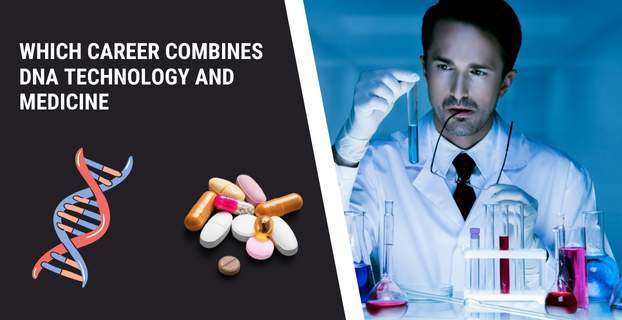Which career combines DNA technology and medicine?
The answer is medical genetics and the jobs that go with it. Clinical geneticists, genetic counselors, and clinical laboratory geneticists are a few examples.
There are many ways that DNA technology can be used in everyday life. Scientists use this technology for a wide range of purposes and products. It involves studying and changing genetic material. In medicine, this technology helps doctors figure out what's wrong with people who have genetic diseases like sickle cell anemia and Huntington's disease. These diseases are passed down from one generation to the next through genes. So, those most at risk can be found early and given help. Also, technology is a very important part of making vaccines. Scientists use it in many ways to make vaccines, like changing the genes of pathogens and making proteins that look like those on their surfaces.
What job combines medicine and DNA technology? Medical genetics is one of the few jobs that use both DNA technology and medicine. It is a branch of medicine that focuses on diagnosing and treating diseases that run in families. Medical genetics treats things like birth defects, autism, cancer, skeletal dysplasia, and other problems that parents can spot in their children.
Medical geneticists are experts who study people's genes to help improve and maintain their health. A lot of schooling is needed to work in this area of medicine. Also, there are several subspecialties within medical genetics, such as genetic counseling, biochemical genetics, clinical molecular genetics, and clinical laboratory genetics. In this article, I talk in detail about medical genetics and how much a medical geneticist makes on average. I'll also talk about what's good and bad about the job.
What does medical genetics mean?
Medical genetics is the branch of medicine that treats and diagnoses hereditary disorders. It encompasses both research and clinical care in this field.
Is working in medical genetics a good job?
Medical or clinical geneticists focus on diseases that run in families. They figure out what's wrong with genes that cause diseases and fix them. Geneticists often help patients and their families understand and deal with genetic disorders that have always been there.
Genetic jobs in the medical field
Here are some jobs in medical genetics that combine medicine and DNA technology.
1. Doctors who work in clinical genetics
A clinical geneticist reads the results of clinical exams and decides on a diagnosis based on those results.
Here are some of the tests a clinical geneticist uses to make a diagnosis:
Carrier testing is done on people who want to find out if a certain genetic disorder runs in their family and if it can be passed on to a child at birth.
A mother may get a prenatal diagnosis to confirm a genetic diagnosis if an ultrasound shows that something is wrong with the fetus. During this kind of procedure, it is common to find out that someone has Down syndrome.
Right after a baby is born, he or she is checked for health problems. After taking blood samples from a newborn, a battery of tests is done to look for problems in the baby's body. In the United States and most other parts of the world, this procedure is required.
Pharmacogenomic testing is done to find out how fast a drug is likely to be broken down. This test will tell the doctor or nurse how different drugs might affect a patient.
Patients who fail this test are often given the drug warfarin.
People are accustomed to using DNA tests to identify people. Its purpose is to find out who someone is and to look into paternity cases. This test is also used by law enforcement to determine a person's DNA in order to locate them.
2. Geneticists who work in clinical labs
A clinical laboratory geneticist takes blood samples and other DNA samples to do the above tests.
3. Genetic Consultants
Based on what a geneticist says about a condition or disorder, genetic counselors tell patients how to treat it. A counselor's job is to teach a person about their illness and how it runs in their family.
They will be able to tell people how to treat their symptoms and take care of their conditions.
4. Genetic Nurse
A genetic nurse's job is to gather information about disease risk factors, whether they are caused by genes or not. The doctor will then use the information to make a diagnosis and figure out if a patient's condition can be passed on to their children. Nurses who specialize in genetics also have to keep detailed medical history records.
The average salary in medical genetics
Even though medical genetics isn't the highest-paying area of medicine, it's a good job for an ex-pat who is interested in health care. Experience has a big effect on pay, and medical geneticists with more experience usually make more. The employer, location, extra skills, and board certification can also affect pay.
The average salary of a medical geneticist in the United States is $65,014 per year (as of September 2019). Most salaries in this field fall somewhere between $31,000 and $89,500.
Clinical geneticists have specialized jobs that pay $90,626 per year. Genetic counselors make about $80,370 per year, while clinical molecular geneticists make about $141,787.
What are the benefits and drawbacks of using DNA technology in medicine?
There are many ways that DNA technology can be used in medicine. One way is through genetic engineering, which is also called recombinant DNA. It uses DNA from different species to make new DNA molecules that are used in medicine, farming, and science.
Vaccines can also be made with the help of DNA technology. Vaccines are made to make our bodies think they are fighting a harmless version of a virus so that when the real, dangerous version of the virus comes along, your body will be ready to fight it.
Insulin and human growth hormone are two examples of these kinds of things. Insulin is used to treat diabetes, while human growth hormone is used to make sure that people with dwarfism have the right amount of hormones.
Also, the company MicroGenDX just did some groundbreaking research on how to treat urinary tract infections.
Using DNA technology to make vaccines has the following benefits:
- Compared to protein vaccines, they are cheap to make.
- more effective at getting antibodies to react.
- more effective at making T-cell responses, which effectively target cancer cells or cells that bacteria or viruses are trying to attack.
- DNA vaccines tend to get FDA approval faster than other vaccines.
Using DNA technology to create vaccines has some drawbacks:
- Changes can be made to the genes that control how cells grow.
- There is a chance that the body will build up a resistance to the antigen.
- Protein immunogens will be limited.
We will talk about how DNA technology can be used in other fields besides medicine.
DNA technology is used in agriculture. You've probably heard of GMOs, which stand for "genetically modified organisms," and people who use synthetic materials to make new genes. These can be used to grow bigger plants with higher yields, improve the nutritional value of crops, and get rid of pests.




.png)

